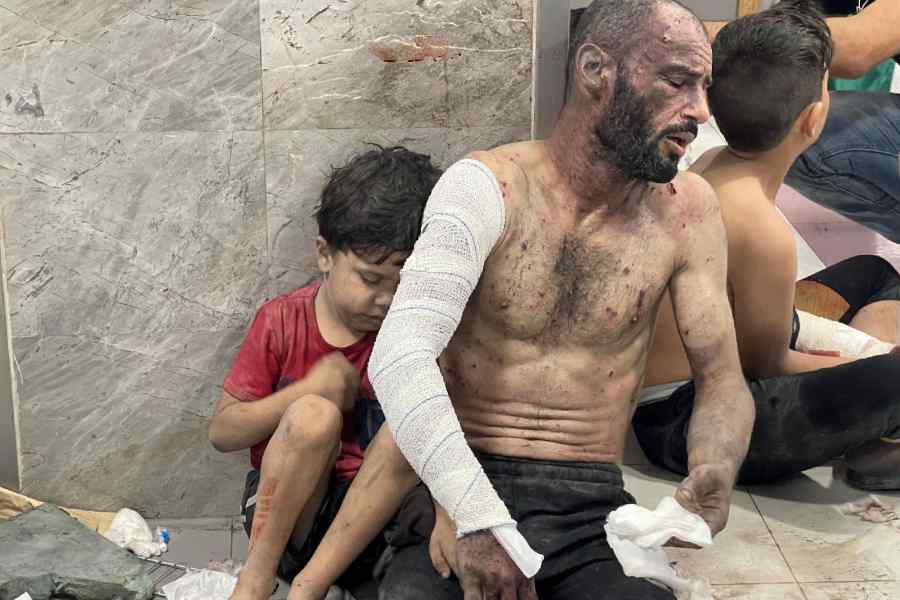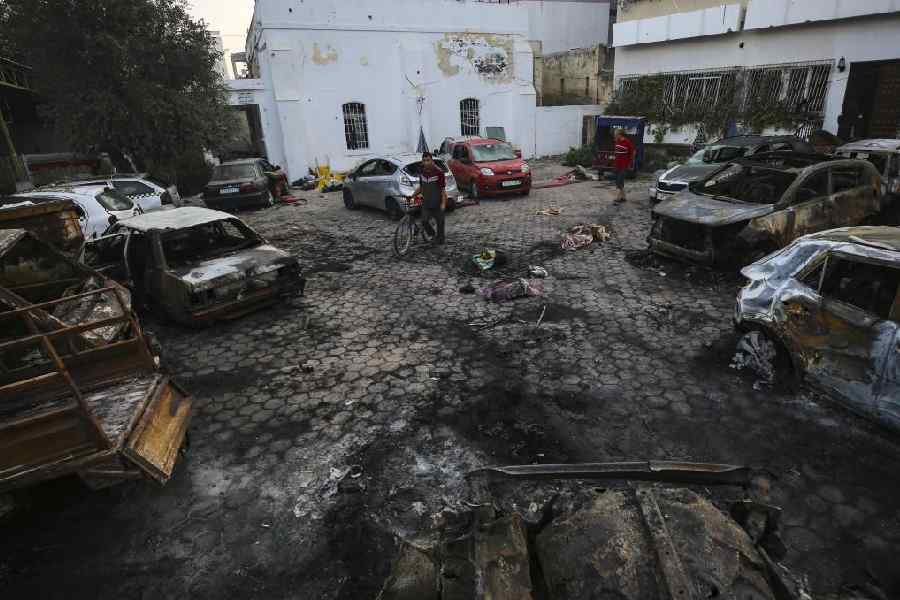Israel bombarded Gaza with more air strikes on Monday as its soldiers fought Hamas militants on the ground in raids within the besieged Palestinian enclave. Gaza's health ministry said 436 people had been killed by Israeli aerial attacks in the past 24 hours, most of them in the south of the narrow, densely populated Gaza Strip.
In signs that the conflict was spreading, Israeli aircraft also struck southern Lebanon overnight and Israeli troops fought Palestinians in the occupied West Bank, residents said.
The United Nations said desperate civilians were running out of food, water and places to shelter from the unrelenting aerial pounding that has flattened swathes of the Hamas-ruled enclave.
Some aid was trickling over one border crossing into Gaza - but only a fraction of the amount needed.
At least 5,087 Palestinians have been killed in two weeks of Israeli strikes, including 2,055 children, the enclave's health ministry said in an update.
The Israeli bombardment was triggered by an October 7 cross-border assault on Israeli communities by Hamas militants who killed 1,400 people and took more than 200 hostage.
Both Israel and Hamas reported overnight clashes in Gaza. Israel said ground forces mounted limited raids to fight Palestinian gunmen and that air strikes focused on sites where Hamas was assembling to ambush any wider Israeli invasion.
"During the night there were raids by tank and infantry forces. These raids are raids that kill squads of terrorists who are preparing for our next stage in the war. These are raids that go deep," chief military spokesperson Rear Admiral Daniel Hagari said in a briefing.
The raids also tried to gather information on the 222 hostages being held by the Islamist Hamas, he said.
Gaza's Hamas-run interior ministry said that at least 18 Palestinians were killed and dozens injured in an Israeli air strike that hit homes in the Al-Saudi and Janina neighbourhoods of Rafah, close to Gaza's southern border with Egypt.
Hamas's armed wing, the Izz el-Deen al-Qassam Brigades, said its fighters engaged with an Israeli force that infiltrated Gaza and they destroyed some Israeli military equipment.
The group said the infiltration by what it described as an armoured force took place east of Khan Younis in southern Gaza.
"Fighters engaged with the infiltrating force, destroying two bulldozers and a tank and forced the force to withdraw, before they returned safely to base," a statement said. There was no Israeli comment about the destruction of equipment. The Al-Qassam Brigades also said on Monday they were firing missiles at the southern Israeli towns of Ashkelon and Mavki'im. Warning sirens blared out on the Israeli side.
Ground assault awaited
Earlier on Monday, the Israeli military said it had struck more than 320 targets in Gaza in the past 24 hours, including a tunnel housing Hamas fighters, dozens of command and lookout posts, and mortar and anti-tank missile launcher positions. Israeli troops and tanks are now massed on the Israeli-Gaza border but how soon they might launch a ground invasion aimed at eliminating Hamas was not clear.
The Middle East's most powerful military faces a group that has built up a large arsenal with Iran's help, fighting in a crowded urban setting and using a vast tunnel network.
Asked by Israeli Army Radio if Washington was pressuring Israel to hold off, Israel's deputy ambassador to the US Eliav Benjamin said: "They understand that we are conducting the war in accordance with our interests. At the end of the day, we will do what we need to do when we need to do it."
The UN humanitarian office (OCHA) said about 1.4 million of Gaza's 2.3 million population were now internally displaced, with many seeking refuge in overcrowded UN emergency shelters. Israel has ordered Gaza residents to evacuate the north. But the OCHA said it believed hundreds and possibly thousands of people who had fled were now returning to the north due to increased bombardments in the south and lack of shelter.
Fears that the Israel-Hamas war could mushroom into a wider Middle East conflict rose over the weekend with Washington warning of a significant risk to US interests in the region and announcing a new deployment of advanced air defences. Along Israel's northern border with Lebanon, the Iran-backed Hezbollah group has clashed with Israeli forces in support of Hamas in the deadliest escalation of frontier violence since an Israel-Hezbollah war in 2006.
Spreading violence
Early on Monday, Israeli aircraft struck two Hezbollah cells in Lebanon that were planning to launch anti-tank missiles and rockets toward Israel, the Israeli military said. Israel had also hit other Hezbollah targets including a compound and an observation post.
Hezbollah said on Monday one of its fighters was killed, without providing details. Israel's military said seven soldiers have been killed on the Lebanese border since the latest conflict began. Iranian security officials told Reuters Iran's strategy was for Middle East proxies like Hezbollah to pursue limited strikes on Israeli and US targets but to avoid a major escalation that would draw in Tehran. In the Israeli-occupied West Bank, two Palestinians were killed at the Jalazone refugee camp near Ramallah, the Palestinian Authority health ministry said.
Residents told Reuters that Israeli forces raided the camp and made many arrests as they clashed with gunmen and some youths who threw stones. The Israeli army has not issued a statement about the incident.
Palestinian Prime Minister Mohammad Shtayyeh called for international unity to stop Israel's attacks in Gaza and allow aid. A second convoy of 14 aid trucks entered the Rafah crossing from Egypt into Gaza on Sunday night.
The U.N. humanitarian office said the volume of aid arriving so far was just 4per cent of the daily average before the hostilities and a fraction of what was needed.
The aid shipments did not include fuel.











